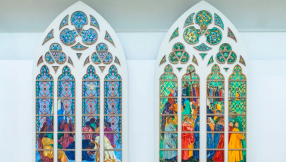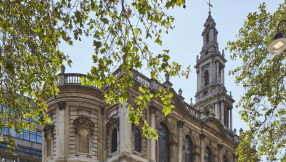
"Whoever dwells in the shelter of the Most High will rest in the shadow of the Almighty... You will not fear the terror of night, nor the arrow that flies by day, nor the pestilence that stalks in the darkness, nor the plague that destroys at midday." (Psalm 91:1,5-6)
"How can you believe in a God who is good when people all over the world are dying from Covid-19?" This was the honest question of a young doctor in the UK (who believes she was infected, although testing wasn't available), and at first, I had no idea how to answer her.
I had been praying about the global pandemic, asking God to slow its spread, to protect frontline staff, to comfort the sick and the grieving, to keep my own loved ones safe ... But I had questions for Him too. Why allow this plague – this pestilence – at all? Does it reflect judgement, and, if so, why are those who love and worship You among the sick? Are you really in control? Why, Lord?
It's okay to challenge God. We know that because it is modelled in the Bible: "Why, Lord, do you stand far off? Why do you hide yourself in times of trouble?" (Psalm 10:1) "How long will the enemy mock you, God? Will the foe revile you forever?" (Psalm 74:10)
Sometimes we don't feel as though we get clear answers; sometimes a response comes in the form of a word from a pastor, or through reading scripture, or when we just get a sudden sense of God's presence and His power. In this case, God's reply to me came through listening to the book of Job while taking my daily permitted hour of exercise.
I have been taking an online course which is intended to provide a survey of the whole Old Testament. It has involved a lot of reading (much of which I have completed through listening to an audio Bible) and has been hard going at times, but there have been many 'lightbulb moments' as history and prophecy and wisdom literature have come together, pointing to various characteristics of a God whom I have mostly known through a New Testament lens.
And I found that the book of Job, read and understood as a whole, had particular resonance at this time of universal strain and trouble.
The patience of Job?
Job is introduced to us as a 'blameless and upright' man who 'feared God and shunned evil' (Job 1:1). And yet he suffers terribly, losing his substantial fortune, his family, and, ultimately, his health (Job 1 and 2). Job's four friends come to his side to 'comfort' him, but all assume that he must have done wrong in God's sight, since God is just and 'does not reject a blameless man' (Job 8:20, Bildad's words), encouraging him to repent so that he might be restored to prosperity (Job 22:21-23).
In several impassioned speeches, Job asserts his innocence; he curses his situation, but he refuses to curse God. In the end, through many rhetorical questions ("Where were you when I laid the earth's foundation? ...Have you ever given orders to the morning, or shown the dawn its place? ...What is the way to the place where lightning is dispersed?" (Job 38-41), God demonstrates that Job's complaints arise from limited understanding, but he exonerates Job and is angry with his accusing friends. At the close of the book, God restores Job's fortunes and his health, showering him with blessings.
Behind the scenes
Of course, there is a back-story to all of this – a backstory of which Job is never made aware. What we readers know is that Job's suffering arises because Satan (the devil) has challenged God, asserting that Job is only faithful because of God's goodness to him, and that he can make Job curse God to his face (Job 1:9-11).
Satan wants to attack God's servant, and God permits this, but he still retains supreme control: Satan will not be allowed to take Job's life (Job 2:6). The torment which Satan unleashes on Job prompts his wife to ask, "Are you still holding on to your integrity? Curse God and die!"
But Job replies, "Shall we accept good from God, and not trouble?"
And we are told, "In all this, Job did not sin in what he said." (Job 2:10)
Satan does not – cannot – win; God will always triumph.
As I read on, I felt as if God was highlighting certain truths about His character and power, and about His care for His people: Job was a good man who loved God; God knew this, yet He allowed him to suffer.
God did not cause his suffering; Satan was wholly responsible for it.
Satan was limited by God – he could not touch Job's person without God's permission.
Job's friends seemed to have reasonable questions – they were right in saying that God is a just God, but they did not know the backstory - because God's higher purposes had not been revealed to them, they made wrong assumptions and were ultimately condemned.
When Job remained loyal, Satan was defeated, and God exerted His power to restore Job.
So, what relevance has all of this to the coronavirus pandemic? How does it help me to answer my doctor friend?
A response
First of all, the book of Job shows that God does, sometimes, allow good people – all types of people – to suffer.
Since we believe that He is all-powerful and could have prevented the Covid-19 pandemic, we must accept that He has permitted it. However, God is not the author of suffering; it originates with the devil. We live in a fallen world where, for a limited time, the forces of evil can cause pain and horrible sadness, just as we see happening all around us as the coronavirus spreads.
Secondly, there will be accusers at times like this. Many will ask what seem to be perfectly reasonable questions, like 'how could a good, just God allow such a plague to be unleashed on innocent people?' Christians may struggle to defend their beliefs, but the faithful will not curse God - neither they nor their accusers know the backstory.
I don't know why God has allowed this, I don't understand it (and I should be open about this with my friend – Job did not pretend that he accepted his suffering blindly), but I realise that there is more going on in the cosmic realm than that which meets my eye.
Finally, evil never wins, and God has the strength to restore. It is right for us to pray for an end to the pandemic; it is right for us to pray for vaccines and treatments, and for healing and for protection. And it is okay for us to challenge God with our questions. But, like Job, we must trust God's supreme sovereignty and must never give in to cursing Him.
In the end, I'll admit to my friend that I find these times as hard as she does, but I believe that God, whose ways are higher than our ways (Isaiah 55:9) will – somehow –make everything beautiful in His time (Ecclesiastes 3:11).
Sharon Hastings is a doctor and author of Wrestling With My Thoughts, published by Inter-Varsity Press.













